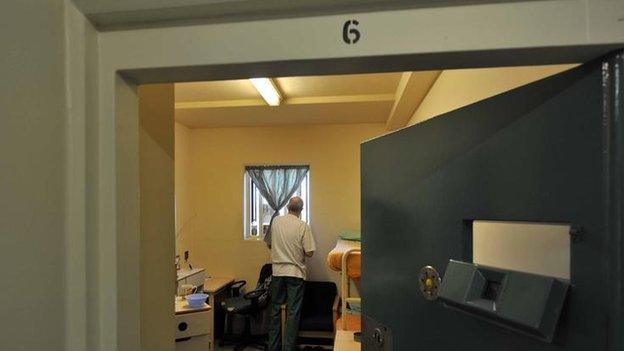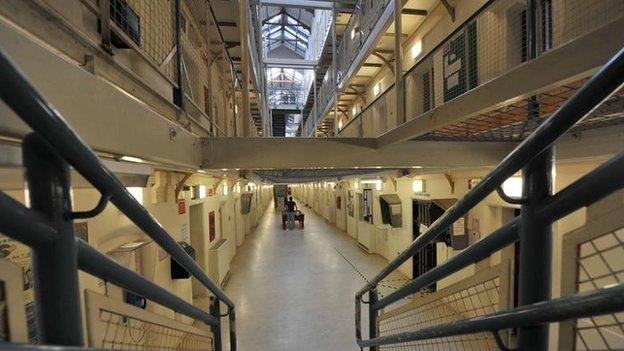Absconding: Why do prisoners take the risk?
- Published

Concerns have been raised by the POA that too many "inappropriate prisoners" are being sent to open prisons
On average, a prisoner walks out of prisons in England and Wales without permission once every 43 hours. But why do they take the risk, when most will end up serving longer inside once caught?
"It is kind of like you have won the lottery, you've escaped, you've turned the tables on them and you have a massive amount of freedom."

Noel "Razor" Smith was previously a career criminal with 58 criminal convictions
Former bank robber and south Londoner Noel "Razor" Smith has served time in 33 different prisons, escaping from category C prison The Verne in 1992 and making several attempts to escape from a category A prison.
Walking out of The Verne in Dorset, Smith said there was a feeling of excitement in the knowledge he was "living on borrowed time".
Jailed for life for armed robbery, he escaped for 79 days, during which he committed a further 15 bank robberies.
He was sentenced to 15 years for the robberies and two years, to run concurrently, for escaping.
"Human beings are not made to be locked up - it's not part of our nature," he said.
"If you are in prison all you dream about is getting out of prison. Nobody wants to be in prison. It's not a holiday camp.
"If you escape prison... you can do whatever you like because you know that it is only a matter of time before they catch you."
Most incidents take place at open prisons, with some offenders keen to be sent back to closed prison conditions, while others may abscond if they feel they have been refused leave unfairly.
Another reason is prisoners struggling to cope with the drugs culture or feeling threatened within open prisons.
"People have walked free from their open prison and straight to the closed prison, knocked on the gates and said 'take us back in - there are too many drugs in the open prison'," said Smith, who was a career criminal for 35 years but now writes for Inside Time, the national newspaper for prisoners.
"The prison system is very big. There's a lot of drugs. The murder rate is seven times higher than outside. There are a lot of attempted murders and assaults."

HMP Sudbury, which has had 985 prisoners abscond since 1995, was criticised in March for failing to prepare inmates for release
Chris, 28, from Nottingham, served three years at HMP Sudbury, an open prison in Derbyshire, towards the end of his sentence for stabbing another man.
He said there were problems with drug-taking inside the prison because the open conditions made it easier to get the drugs in.
"Someone came into my room and said 'do you want to buy some ecstasy?' I said 'no. I'm sitting in a prison cell, why do I want ecstasy?'" he said.
"There were a lot of not very nice people there."
Smith found himself in an open prison - Blantyre House in Kent - only once, in 2008. By this point he "had had enough" and wanted to keep his head down.
But he said prisoners desperate to get away from cellmates taking drugs and tensions between different "classes" of prisoners were common problems.
"You're surrounded by basically petty criminals who are on shorter sentences and don't really give a toss," he said.
"They will start a fight with a lifer who has served 20 years, and the lifer will go back into closed conditions for six or seven years, while the person on the short sentence will get out.
"It's absolute madness. So open prisons for long termers are a very frightening prospect, it is like a minefield."

When caught, absconders are often sent back to higher security prisons
When prisoners abscond they are usually caught and sent back to prison, where they are likely to stay for longer than if they had not absconded in the first place.
Despite this, 204 prisoners absconded from open prisons in England and Wales between April 2012 and March 2013.
This is a fall from a peak figure of 1,301 absconds in the year 2003-04, but one that still equals an average of one absconder every 43 hours.
In the year 2012-13 a further 431 prisoners failed to return to prison after being given temporary leave.
The POA union, previously known as the Prison Officers' Association, has criticised open prisons for their high absconding record.
"We are concerned at the current allocation system, which resulted in dangerous offenders being placed in open conditions far too early," said spokesman Glyn Travis.
"The union has been campaigning for a change to the current system for seven years and despite our concerns the tickbox mentality of allocating prisoners remains in place."
The POA said while the numbers may have reduced across open prisons, the risk to the public and staff had not reduced.
"No-one really knows why prisoners abscond but staff believe it is because they feel vulnerable, are being bullied and want to avoid the gang culture which exists in most open prisons," Mr Travis said.
"The underlying factor, of course, is that there is little or no consequences for their actions. The recent well-publicised absconds of dangerous offenders must now force the Ministry of Justice to act."
Prisons Minister Jeremy Wright admitted the system "has been too lax up to now" but said the Ministry of Justice was changing that.
"We are not prepared to see public safety compromised," he said.
"In future when prisoners are let out on temporary licence they will be tagged, more strictly risk assessed and tested in the community under strict conditions before being released."
- Published19 May 2014

- Published9 May 2014

- Published12 March 2014

- Published3 March 2013

- Published24 August 2010